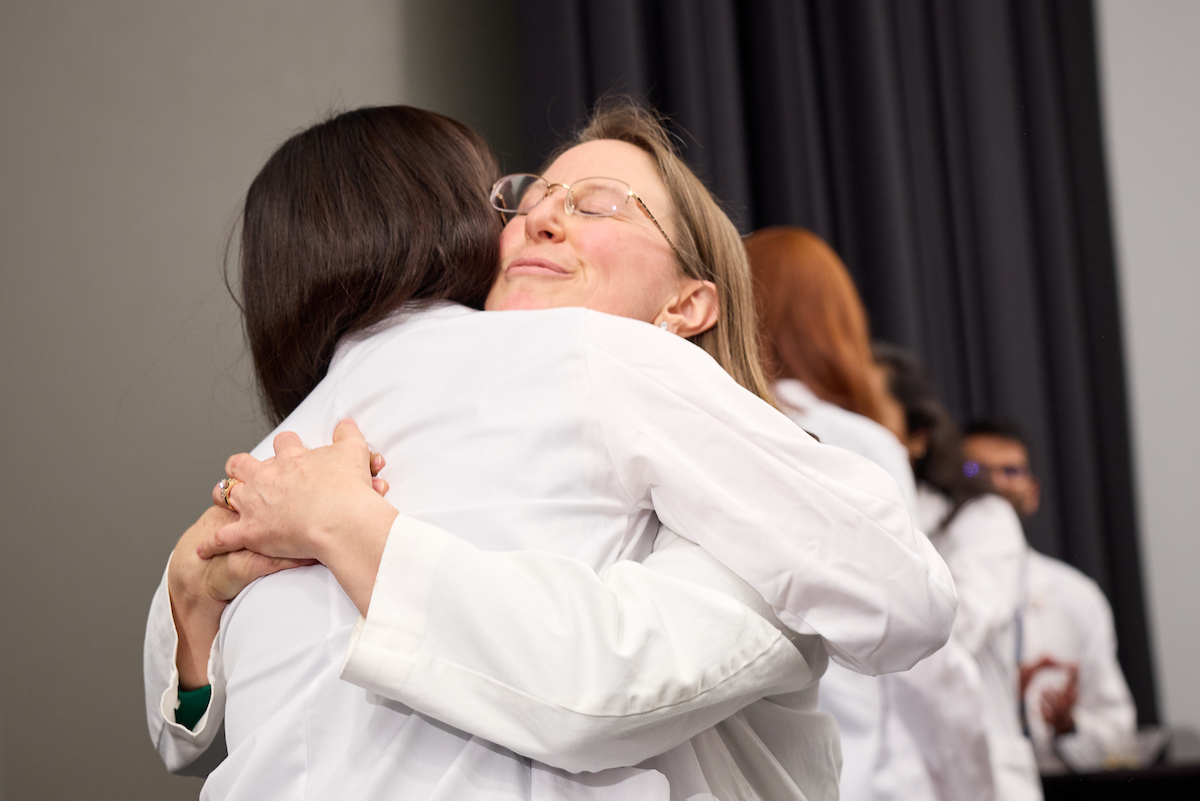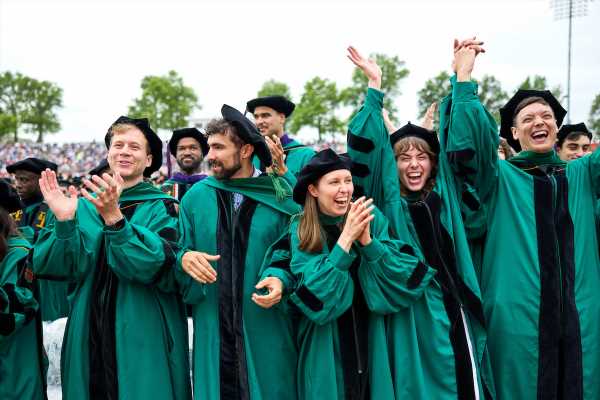The new MD curriculum at Washington University School of Medicine in St. Louis was recently put to a test – and passed with flying colors. The Liaison Committee on Medical Education (LCME) has awarded full accreditation to the medical school for another eight years – the longest possible term – and is a validation of the school’s historic $100 million investment in modernizing its MD training curriculum and providing critical support for student scholarships.
What’s more, WashU Medicine’s investment in, and commitment to, MD education and student scholarships occurred amidst school-wide efforts to expand its world-class clinical and research programs, and created a synergy that further enhances students’ experiences and their opportunities to grow personally and professionally.
The new Gateway Curriculum was launched in 2020 – at the height of the pandemic – and is the first re-envisioning of the school’s educational program in more than two decades. The curriculum emphasizes early clinical immersion, health equity and community health care, and training physicians in academic medicine. Students are mentored and coached from their first days on campus, creating an atmosphere of support that helps students develop their professional identities and pursue their career goals. Such aspects of the curriculum have prompted other top-tier medical institutions to study WashU’s MD curriculum as a model.
“The Liaison Committee on Medical Education’s decision to fully accredit the School of Medicine, and for the longest possible term, amid a major curriculum modernization rolled out during a pandemic, is an unequivocal validation of what we already know: There is no place like WashU when it comes to medical education in the 21st century,” said David H. Perlmutter, MD, executive vice chancellor for medical affairs, the George and Carol Bauer Dean of the School of Medicine and the Spencer T. and Ann W. Olin Distinguished Professor. “I am so proud of how our community of faculty and staff and students have rallied around education as core to our mission and something that must adapt and evolve as the world around us changes.
“Our students receive their training in one of the largest and most innovative clinical practices in the nation while also experiencing the power of biomedical research that has always been the hallmark of WashU Medicine,” Perlmutter said. “Few medical schools can say they are leaders in research, teaching and patient care. That we excel in each of these areas is a tribute to our amazing faculty and staff and is what makes the experiences of our students unique.”
Additionally, the medical school’s investment in its curriculum is bolstered by its commitment to alleviating educational debt, opening the door to a more diverse student body and increasing students’ freedom to pursue the medical and academic specialties they are most passionate about rather than selecting those that will pay off debt more quickly. Of the entering class of 2023, 85% of students are receiving merit and/or need-based scholarship funding and 59% have full tuition funding.
The LCME accreditation process began during the pandemic, in fall 2021, a year after the launch of the Gateway Curriculum. The committee’s various criteria for evaluation included an on-site, 2 ½-day visit; interviews with faculty, staff and students; data compiled in an extensive report for the committee; an institutional self-assessment; and an independent student analysis that surveyed the medical school’s aspiring physicians on the program’s strengths and opportunities for improvement. Regarding the latter, the survey was taken by 96% of the students, a completion rate considered especially high.
Since the curriculum’s inception, medical students have cited its emphasis on health equity as a leading reason for training at Washington University. Health is determined, in part, by where people live, work and attend school, and inequities across communities can contribute to inequities in health. “We have a strong focus on understanding health equity throughout our curriculum both in the classroom and in the clinical space,” said Eva Aagaard, MD, vice chancellor for medical education, senior associate dean for education, and the Carol B. and Jerome T. Loeb Professor of Medical Education. “We also provide training experiences in the community and have strong collaborations with local federally qualified health centers, which care for people in under-resourced communities.
“The feedback I received from the LCME assessment was that the new curriculum encourages students to pursue their passions in medicine – whatever they are,” Aagaard added. “We are providing excellent training in core knowledge, clinical skills, health system understanding, and social sciences to support well-rounded physicians capable of caring for diverse populations. And we are also training future doctors who are reflective, self-directed and lifelong learners, in whatever clinical or academic field they choose.”
The LCME accreditation assessment process was led by the Office of Education’s Eve R. Colson, MD, a professor of pediatrics and an associate dean for program evaluation and continuous quality improvement, and Leslie Blaylock, director of innovation and continuous quality improvement. Colson and Blaylock each have master’s degrees in education.
“Eva Aagaard is a visionary leader who is incredibly knowledgeable about cutting-edge, evidence-based medical education,” Colson said. “She understands the systems and people that need to be in place to build a new curriculum that meets and exceeds accreditation standards. Despite the global pandemic, she brought together an amazing and dedicated team to build and sustain a top-tier medical education program.”
Added Blaylock: “We are very fortunate to work at an institution that has such tremendous resources, which is because of our amazing leadership and faculty, staff and students who are passionate about the medical school’s mission. The fact that we received this incredible rating during a pandemic, while launching the transformational Gateway Curriculum, all while continuing to provide the best patient care and leading the way in the research realm, is truly a testament to Washington University School of Medicine’s dedication and excellence.”

Source: Read Full Article






